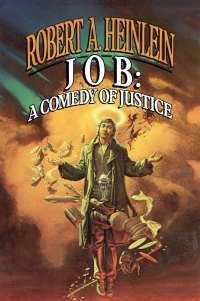 This is a later Heinlein novel. Published in 1984, it has a heft to it that the earlier rocket jockey stuff had, but it’s a bit boggy and ends less than well from my perspective.
This is a later Heinlein novel. Published in 1984, it has a heft to it that the earlier rocket jockey stuff had, but it’s a bit boggy and ends less than well from my perspective.
The story: A fundraiser from a world where religious fundamentalism has its way is on vacation cruise when he bets fellow passengers that he could walk on fire like the south Pacific natives. After he does, he faints from the fumes, and when he awakens, he is not in his own world any more. Things have changed, from the underlying technologies to the name by which his fellow passengers recognize him. He discovers that his alter-ego in this world is carrying a million dollars in cash and has been having a (sinful!) fling with an attractive ship’s maid. After a while, he professes his love for her and suddenly, both of them find themselves shifting worlds with nothing but what they’re wearing and carrying. On each, they pick themselves up and make plans, only to be thwarted when worlds shift again.
It’s an interesting conceit, but it becomes a little unfocused toward the middle, and the last quarter or fifth of the book gets a little unwound as the book, as a wise man put it in a comment on the review of The Cat Who Walks Through Walls:
…its final act falls apart when the story goes cosmic.
At the end, we have a relationship of Satan and Yahweh along with some other deities as subordinate to a still higher power (which might be subordinate to an even higher power, onto infinity). Of course, spoiler alert: They were testing this fellow, and the end takes place after Armageddon. Also, after Ragnarok. Where the world has not ended for the Norse gods somehow.
You know, trying to weave actual theological entities into fantasy novels is most often a real mess (see also Anthony’s Incarnations of Immortality series, the for-a-while-last, but now penultimate, book dealing with God somehow–I’ve not made it through that particular volume).
Still, Job is a good read in spite of all of that. Heinlein keeps the story moving along rather well, which is a nice contrast to the other science fiction book I’ve read recently (Voyage From Yesteryear). I’m pleased to be getting to the end of the Heinlein later stuff, but I probably won’t reread it unlike some of the rocket jockey stuff.



Not wise, just lucky ;-)
I remember being disappointed when this one collapsed. “Friday” held together so well compared to the landfill of “Beast” & I really thought Heinlein had given up the bad-sermon-as-novel business. Until the Rapture and its aftermath, the seeming thousand-year reign of the grumpy old writer kvetching about religions that dared suggest someone might know better than him about something.
I wonder how much success influences writers in this regard. They start out being able to tell a good story, and people buy the books for their good stories, and suddenly the writer has something to say, and the books still sell because the readers hope that each new novel will be like the old stuff, but they never are.
I’d like to think I would be different, but probably not.
I think there’s something to that. Heinlein complicates matters by bringing his monumentally robust view of himself to the table, but I think the praise heaped upon “Strangers” just disassociated him from feeling any real obligation to craft a real narrative vehicle for his commentary on the human condition.
I’ve read his memo to Niven and Pournelle about “Mote in God’s Eye” and I kept thinking that someone should have taken him aside and said every last one of those things to him about “Fear No Evil” or “Time Enough for Love.” Not “Number;” it’s beyond salvage ;-)
The idea explains the heck out of George Martin, for certain.
Do the eighties mark the beginning of the Writer as Icon or Industry like that, where the name alone continued to move books after the quality tailed off and where the name itself was a brand a la Tom Clancy, James Patterson, and Robert B. Parker.
Or do the seeds start earlier with the men’s adventure paperbacks and women’s romances by subscription, where the quality fluctuated from month to month, but people kept buying.
I think it metastasized during that era, yes. You can find some examples of it earlier, even at the big-league writer level — Steinbeck’s 1962 “Winter of Our Discontent” was hailed as a return to form after 20+ years of substandard offerings, but he had continued to sell well through the whole period. And on the middle-brow range, like the way Burroughs’ last handfuls of Tarzan or John Carter novels did very little that was new or innovative within their narrative worlds.
The subscription series were pretty much designed to be one-bad-apple proof, weren’t they? That’s why the string of authors all used the same pseudonym.